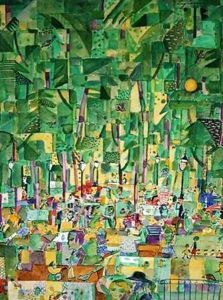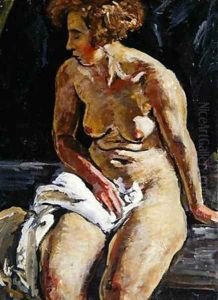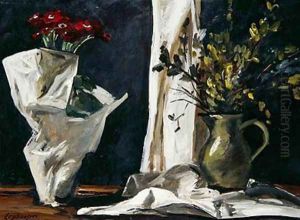Karl Leyhausen Paintings
Karl Leyhausen was a German artist known for his contributions to painting, particularly in the mid to late 20th century. Born in 1920, Leyhausen's early life was marked by the tumultuous backdrop of Germany's political and social upheaval, which inevitably influenced his artistic direction and thematic choices. Growing up during the Weimar Republic and coming of age during the rise of the Nazi regime, Leyhausen's early experiences provided him with a unique perspective on the human condition, a theme that would resonate throughout his work.
Leyhausen's artistic journey began in earnest after World War II, a period when Europe was rebuilding and redefining itself. He was part of a generation of artists seeking new ways to express the collective trauma of the war and the hope for a peaceful future. Leyhausen's work from this period reflects a keen interest in exploring the emotional depth and complexity of human experiences through abstract and figurative representations. His style evolved over the years, incorporating elements of Expressionism and Surrealism, yet he maintained a distinctive voice that emphasized the intertwining of despair and beauty, destruction, and rebirth.
Throughout the 1950s and 1960s, Leyhausen became increasingly involved in the German art scene, participating in exhibitions and gaining recognition for his unique approach to painting. His works from this period often featured bold colors, dynamic compositions, and a tension between realism and abstraction, reflecting the artist's ongoing exploration of the human psyche and the existential dilemmas of the era.
Despite facing the challenges of an evolving art market and the shifting landscapes of post-war Europe, Leyhausen continued to produce work that was both introspective and innovative. By the 1970s and 1980s, his art had matured, embodying a sense of resolution and tranquility that contrasted with his earlier, more turbulent pieces. This later work resonated with audiences seeking solace and reflection in the aftermath of the century's earlier conflicts.
Karl Leyhausen passed away in 2003, leaving behind a legacy that encapsulates a pivotal period in European history through the lens of his artistic vision. His contributions to the art world are remembered for their emotional depth, technical skill, and the ability to capture the essence of human resilience and vulnerability. Leyhausen's work continues to be celebrated and studied for its historical significance and its profound impact on the development of modern art in Germany and beyond.





